Contract Law Analysis: Sales of Goods, Mistakes, and Postal Rule
VerifiedAdded on 2023/05/29
|10
|2999
|118
Report
AI Summary
This report provides a comprehensive overview of contract law principles relevant to business-to-business (B2B) transactions. It begins by outlining key legislation and regulations governing the sale of goods, including the Sale of Goods Act 1979 and competition law. The report then defines and differentiates various contract law concepts, such as innominate terms, misrepresentation (including its different types), void and voidable contracts, sales by sample, and frustrated contracts. It further examines specific legal aspects like the Law Reform (Frustrated Contracts) Act 1943, remoteness of damages, and the application of injunctions. Part B delves into the types of mistakes within contract law, particularly unilateral mistakes, and their implications on contract validity. Part C focuses on a case study scenario involving a contract formation dispute, addressing the issue of whether a valid contract was formed between two parties, Ruby and Kim, with a specific emphasis on the postal rule. The analysis covers rules for contract validity and the applicability of the postal rule in a given scenario, considering the communication method agreed upon by the parties.

Accounting and Finance
Paraphrase This Document
Need a fresh take? Get an instant paraphrase of this document with our AI Paraphraser
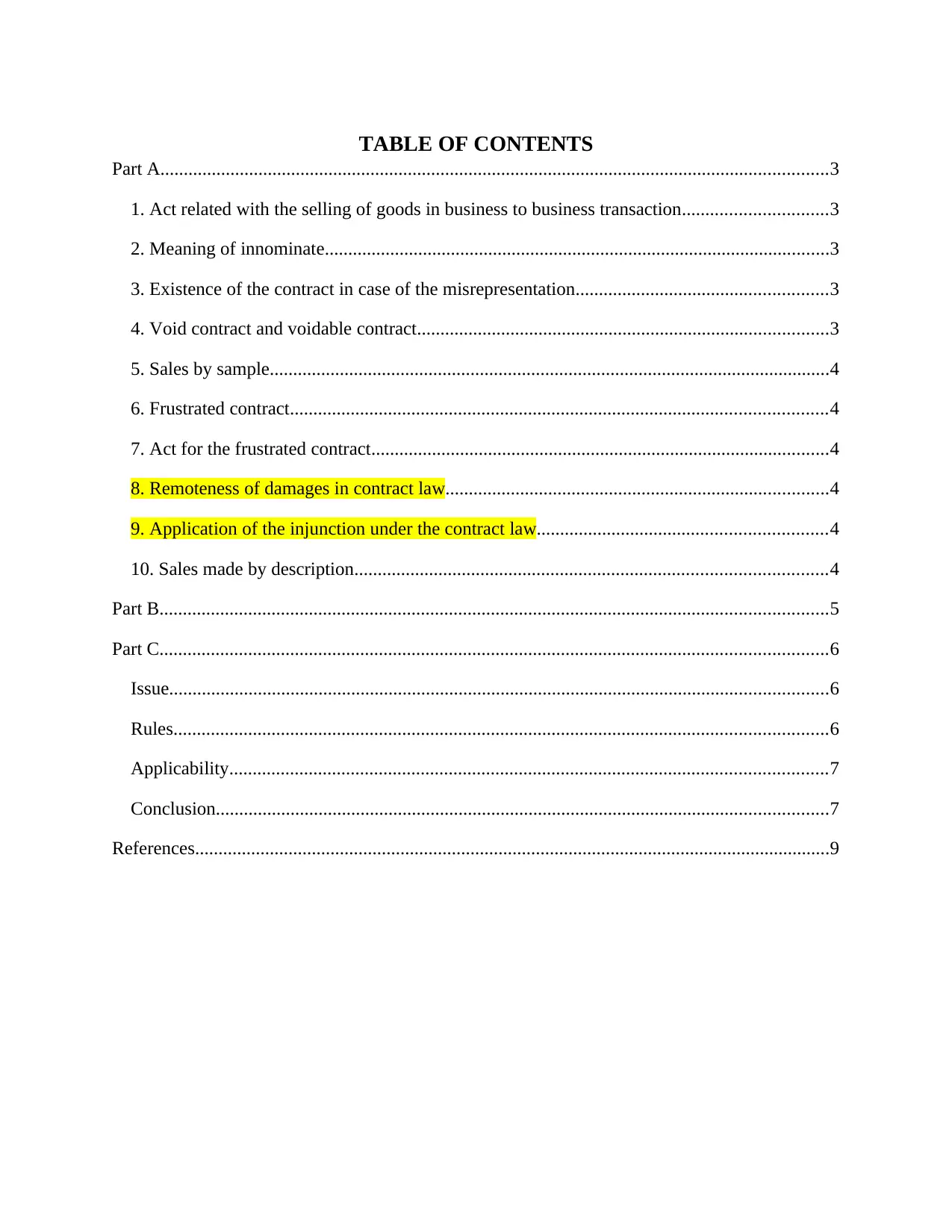
TABLE OF CONTENTS
Part A...............................................................................................................................................3
1. Act related with the selling of goods in business to business transaction...............................3
2. Meaning of innominate............................................................................................................3
3. Existence of the contract in case of the misrepresentation......................................................3
4. Void contract and voidable contract........................................................................................3
5. Sales by sample........................................................................................................................4
6. Frustrated contract...................................................................................................................4
7. Act for the frustrated contract..................................................................................................4
8. Remoteness of damages in contract law..................................................................................4
9. Application of the injunction under the contract law..............................................................4
10. Sales made by description.....................................................................................................4
Part B...............................................................................................................................................5
Part C...............................................................................................................................................6
Issue.............................................................................................................................................6
Rules............................................................................................................................................6
Applicability................................................................................................................................7
Conclusion...................................................................................................................................7
References........................................................................................................................................9
Part A...............................................................................................................................................3
1. Act related with the selling of goods in business to business transaction...............................3
2. Meaning of innominate............................................................................................................3
3. Existence of the contract in case of the misrepresentation......................................................3
4. Void contract and voidable contract........................................................................................3
5. Sales by sample........................................................................................................................4
6. Frustrated contract...................................................................................................................4
7. Act for the frustrated contract..................................................................................................4
8. Remoteness of damages in contract law..................................................................................4
9. Application of the injunction under the contract law..............................................................4
10. Sales made by description.....................................................................................................4
Part B...............................................................................................................................................5
Part C...............................................................................................................................................6
Issue.............................................................................................................................................6
Rules............................................................................................................................................6
Applicability................................................................................................................................7
Conclusion...................................................................................................................................7
References........................................................................................................................................9
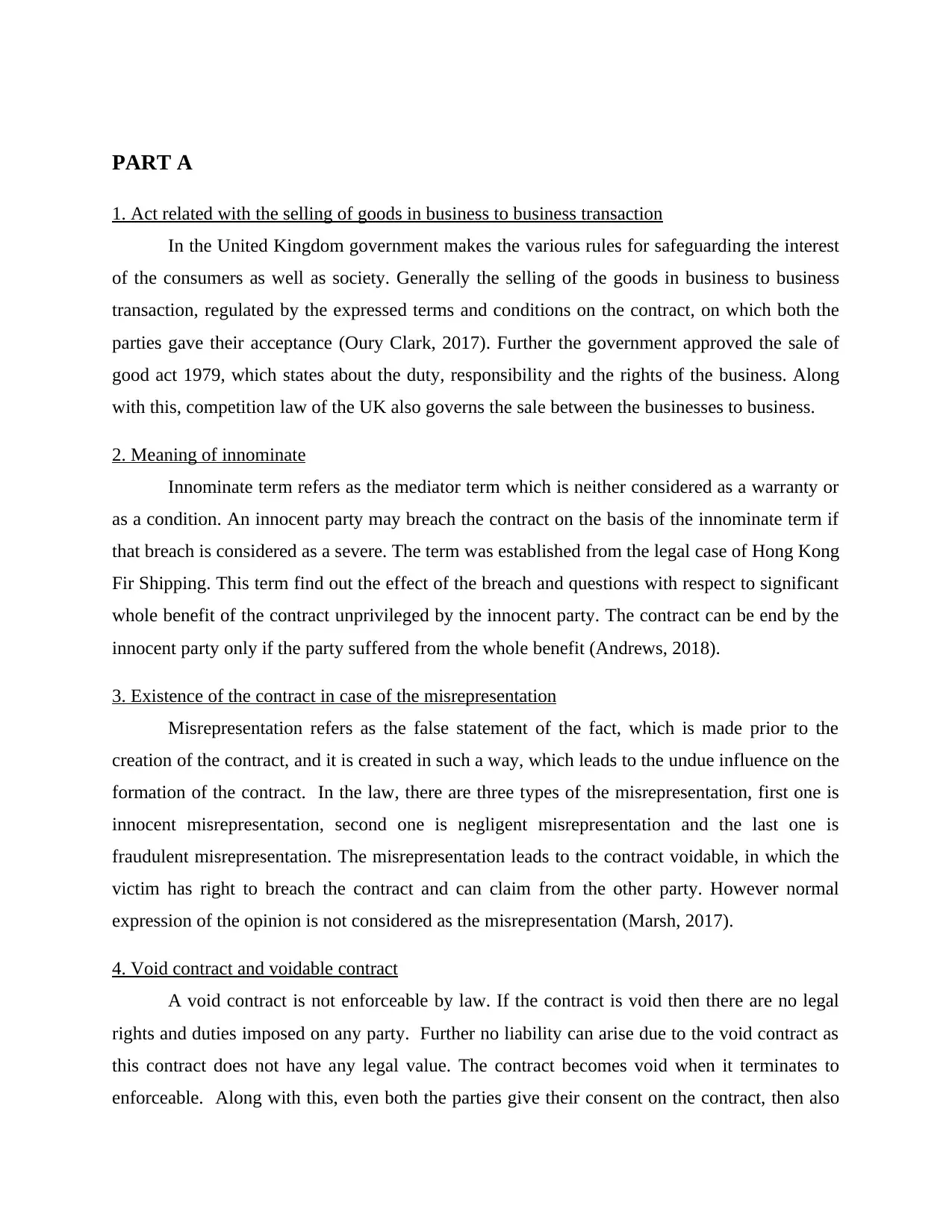
PART A
1. Act related with the selling of goods in business to business transaction
In the United Kingdom government makes the various rules for safeguarding the interest
of the consumers as well as society. Generally the selling of the goods in business to business
transaction, regulated by the expressed terms and conditions on the contract, on which both the
parties gave their acceptance (Oury Clark, 2017). Further the government approved the sale of
good act 1979, which states about the duty, responsibility and the rights of the business. Along
with this, competition law of the UK also governs the sale between the businesses to business.
2. Meaning of innominate
Innominate term refers as the mediator term which is neither considered as a warranty or
as a condition. An innocent party may breach the contract on the basis of the innominate term if
that breach is considered as a severe. The term was established from the legal case of Hong Kong
Fir Shipping. This term find out the effect of the breach and questions with respect to significant
whole benefit of the contract unprivileged by the innocent party. The contract can be end by the
innocent party only if the party suffered from the whole benefit (Andrews, 2018).
3. Existence of the contract in case of the misrepresentation
Misrepresentation refers as the false statement of the fact, which is made prior to the
creation of the contract, and it is created in such a way, which leads to the undue influence on the
formation of the contract. In the law, there are three types of the misrepresentation, first one is
innocent misrepresentation, second one is negligent misrepresentation and the last one is
fraudulent misrepresentation. The misrepresentation leads to the contract voidable, in which the
victim has right to breach the contract and can claim from the other party. However normal
expression of the opinion is not considered as the misrepresentation (Marsh, 2017).
4. Void contract and voidable contract
A void contract is not enforceable by law. If the contract is void then there are no legal
rights and duties imposed on any party. Further no liability can arise due to the void contract as
this contract does not have any legal value. The contract becomes void when it terminates to
enforceable. Along with this, even both the parties give their consent on the contract, then also
1. Act related with the selling of goods in business to business transaction
In the United Kingdom government makes the various rules for safeguarding the interest
of the consumers as well as society. Generally the selling of the goods in business to business
transaction, regulated by the expressed terms and conditions on the contract, on which both the
parties gave their acceptance (Oury Clark, 2017). Further the government approved the sale of
good act 1979, which states about the duty, responsibility and the rights of the business. Along
with this, competition law of the UK also governs the sale between the businesses to business.
2. Meaning of innominate
Innominate term refers as the mediator term which is neither considered as a warranty or
as a condition. An innocent party may breach the contract on the basis of the innominate term if
that breach is considered as a severe. The term was established from the legal case of Hong Kong
Fir Shipping. This term find out the effect of the breach and questions with respect to significant
whole benefit of the contract unprivileged by the innocent party. The contract can be end by the
innocent party only if the party suffered from the whole benefit (Andrews, 2018).
3. Existence of the contract in case of the misrepresentation
Misrepresentation refers as the false statement of the fact, which is made prior to the
creation of the contract, and it is created in such a way, which leads to the undue influence on the
formation of the contract. In the law, there are three types of the misrepresentation, first one is
innocent misrepresentation, second one is negligent misrepresentation and the last one is
fraudulent misrepresentation. The misrepresentation leads to the contract voidable, in which the
victim has right to breach the contract and can claim from the other party. However normal
expression of the opinion is not considered as the misrepresentation (Marsh, 2017).
4. Void contract and voidable contract
A void contract is not enforceable by law. If the contract is void then there are no legal
rights and duties imposed on any party. Further no liability can arise due to the void contract as
this contract does not have any legal value. The contract becomes void when it terminates to
enforceable. Along with this, even both the parties give their consent on the contract, then also
⊘ This is a preview!⊘
Do you want full access?
Subscribe today to unlock all pages.

Trusted by 1+ million students worldwide
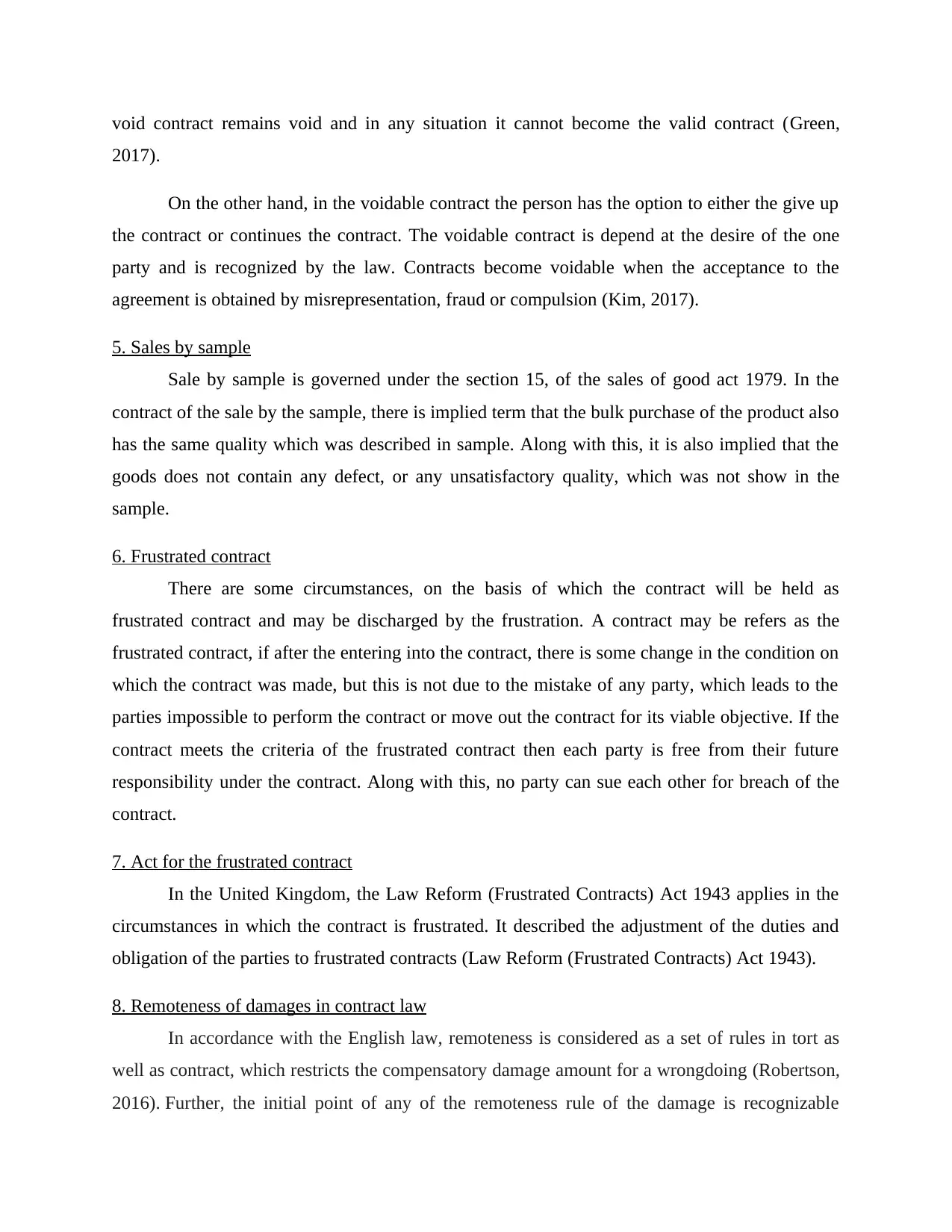
void contract remains void and in any situation it cannot become the valid contract (Green,
2017).
On the other hand, in the voidable contract the person has the option to either the give up
the contract or continues the contract. The voidable contract is depend at the desire of the one
party and is recognized by the law. Contracts become voidable when the acceptance to the
agreement is obtained by misrepresentation, fraud or compulsion (Kim, 2017).
5. Sales by sample
Sale by sample is governed under the section 15, of the sales of good act 1979. In the
contract of the sale by the sample, there is implied term that the bulk purchase of the product also
has the same quality which was described in sample. Along with this, it is also implied that the
goods does not contain any defect, or any unsatisfactory quality, which was not show in the
sample.
6. Frustrated contract
There are some circumstances, on the basis of which the contract will be held as
frustrated contract and may be discharged by the frustration. A contract may be refers as the
frustrated contract, if after the entering into the contract, there is some change in the condition on
which the contract was made, but this is not due to the mistake of any party, which leads to the
parties impossible to perform the contract or move out the contract for its viable objective. If the
contract meets the criteria of the frustrated contract then each party is free from their future
responsibility under the contract. Along with this, no party can sue each other for breach of the
contract.
7. Act for the frustrated contract
In the United Kingdom, the Law Reform (Frustrated Contracts) Act 1943 applies in the
circumstances in which the contract is frustrated. It described the adjustment of the duties and
obligation of the parties to frustrated contracts (Law Reform (Frustrated Contracts) Act 1943).
8. Remoteness of damages in contract law
In accordance with the English law, remoteness is considered as a set of rules in tort as
well as contract, which restricts the compensatory damage amount for a wrongdoing (Robertson,
2016). Further, the initial point of any of the remoteness rule of the damage is recognizable
2017).
On the other hand, in the voidable contract the person has the option to either the give up
the contract or continues the contract. The voidable contract is depend at the desire of the one
party and is recognized by the law. Contracts become voidable when the acceptance to the
agreement is obtained by misrepresentation, fraud or compulsion (Kim, 2017).
5. Sales by sample
Sale by sample is governed under the section 15, of the sales of good act 1979. In the
contract of the sale by the sample, there is implied term that the bulk purchase of the product also
has the same quality which was described in sample. Along with this, it is also implied that the
goods does not contain any defect, or any unsatisfactory quality, which was not show in the
sample.
6. Frustrated contract
There are some circumstances, on the basis of which the contract will be held as
frustrated contract and may be discharged by the frustration. A contract may be refers as the
frustrated contract, if after the entering into the contract, there is some change in the condition on
which the contract was made, but this is not due to the mistake of any party, which leads to the
parties impossible to perform the contract or move out the contract for its viable objective. If the
contract meets the criteria of the frustrated contract then each party is free from their future
responsibility under the contract. Along with this, no party can sue each other for breach of the
contract.
7. Act for the frustrated contract
In the United Kingdom, the Law Reform (Frustrated Contracts) Act 1943 applies in the
circumstances in which the contract is frustrated. It described the adjustment of the duties and
obligation of the parties to frustrated contracts (Law Reform (Frustrated Contracts) Act 1943).
8. Remoteness of damages in contract law
In accordance with the English law, remoteness is considered as a set of rules in tort as
well as contract, which restricts the compensatory damage amount for a wrongdoing (Robertson,
2016). Further, the initial point of any of the remoteness rule of the damage is recognizable
Paraphrase This Document
Need a fresh take? Get an instant paraphrase of this document with our AI Paraphraser
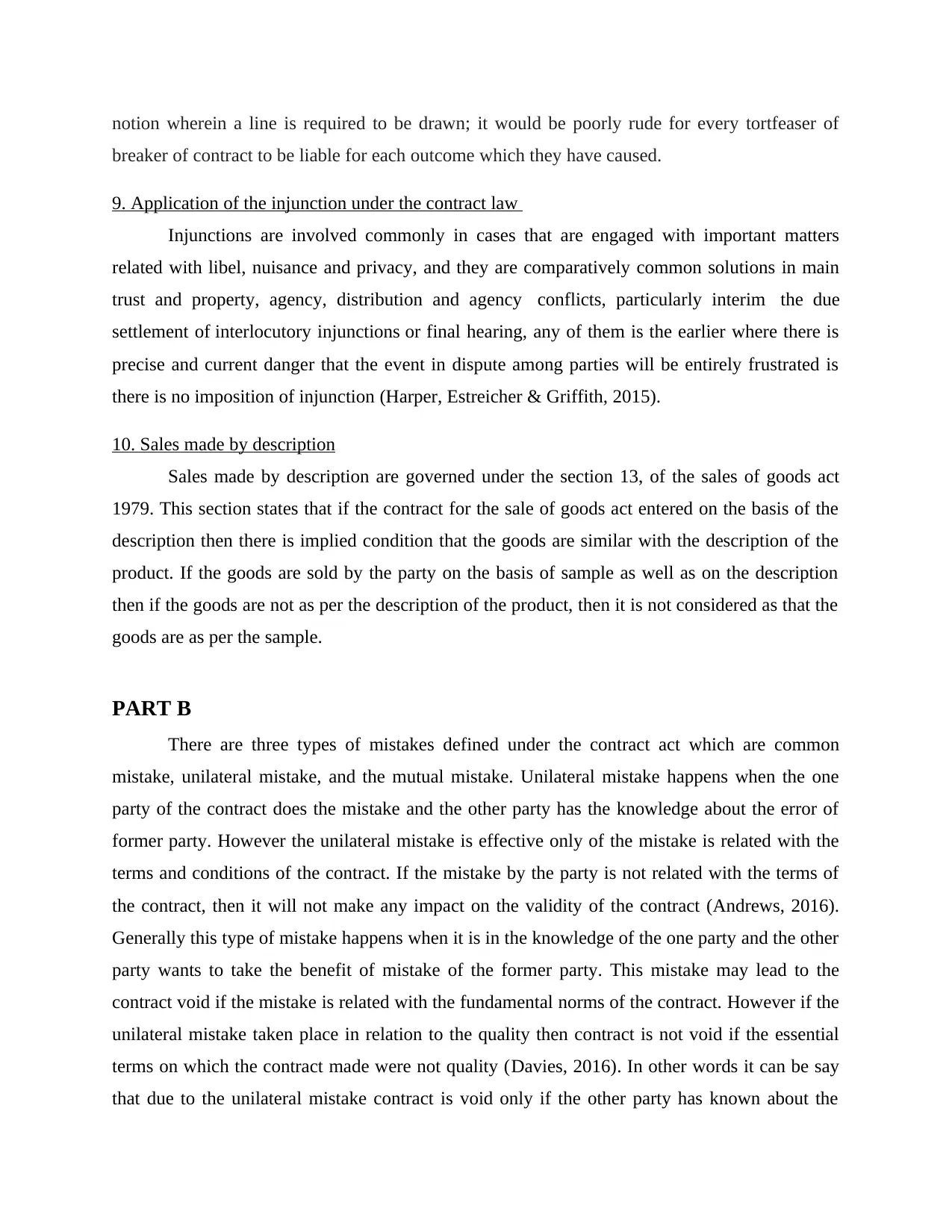
notion wherein a line is required to be drawn; it would be poorly rude for every tortfeaser of
breaker of contract to be liable for each outcome which they have caused.
9. Application of the injunction under the contract law
Injunctions are involved commonly in cases that are engaged with important matters
related with libel, nuisance and privacy, and they are comparatively common solutions in main
trust and property, agency, distribution and agency conflicts, particularly interim the due
settlement of interlocutory injunctions or final hearing, any of them is the earlier where there is
precise and current danger that the event in dispute among parties will be entirely frustrated is
there is no imposition of injunction (Harper, Estreicher & Griffith, 2015).
10. Sales made by description
Sales made by description are governed under the section 13, of the sales of goods act
1979. This section states that if the contract for the sale of goods act entered on the basis of the
description then there is implied condition that the goods are similar with the description of the
product. If the goods are sold by the party on the basis of sample as well as on the description
then if the goods are not as per the description of the product, then it is not considered as that the
goods are as per the sample.
PART B
There are three types of mistakes defined under the contract act which are common
mistake, unilateral mistake, and the mutual mistake. Unilateral mistake happens when the one
party of the contract does the mistake and the other party has the knowledge about the error of
former party. However the unilateral mistake is effective only of the mistake is related with the
terms and conditions of the contract. If the mistake by the party is not related with the terms of
the contract, then it will not make any impact on the validity of the contract (Andrews, 2016).
Generally this type of mistake happens when it is in the knowledge of the one party and the other
party wants to take the benefit of mistake of the former party. This mistake may lead to the
contract void if the mistake is related with the fundamental norms of the contract. However if the
unilateral mistake taken place in relation to the quality then contract is not void if the essential
terms on which the contract made were not quality (Davies, 2016). In other words it can be say
that due to the unilateral mistake contract is void only if the other party has known about the
breaker of contract to be liable for each outcome which they have caused.
9. Application of the injunction under the contract law
Injunctions are involved commonly in cases that are engaged with important matters
related with libel, nuisance and privacy, and they are comparatively common solutions in main
trust and property, agency, distribution and agency conflicts, particularly interim the due
settlement of interlocutory injunctions or final hearing, any of them is the earlier where there is
precise and current danger that the event in dispute among parties will be entirely frustrated is
there is no imposition of injunction (Harper, Estreicher & Griffith, 2015).
10. Sales made by description
Sales made by description are governed under the section 13, of the sales of goods act
1979. This section states that if the contract for the sale of goods act entered on the basis of the
description then there is implied condition that the goods are similar with the description of the
product. If the goods are sold by the party on the basis of sample as well as on the description
then if the goods are not as per the description of the product, then it is not considered as that the
goods are as per the sample.
PART B
There are three types of mistakes defined under the contract act which are common
mistake, unilateral mistake, and the mutual mistake. Unilateral mistake happens when the one
party of the contract does the mistake and the other party has the knowledge about the error of
former party. However the unilateral mistake is effective only of the mistake is related with the
terms and conditions of the contract. If the mistake by the party is not related with the terms of
the contract, then it will not make any impact on the validity of the contract (Andrews, 2016).
Generally this type of mistake happens when it is in the knowledge of the one party and the other
party wants to take the benefit of mistake of the former party. This mistake may lead to the
contract void if the mistake is related with the fundamental norms of the contract. However if the
unilateral mistake taken place in relation to the quality then contract is not void if the essential
terms on which the contract made were not quality (Davies, 2016). In other words it can be say
that due to the unilateral mistake contract is void only if the other party has known about the
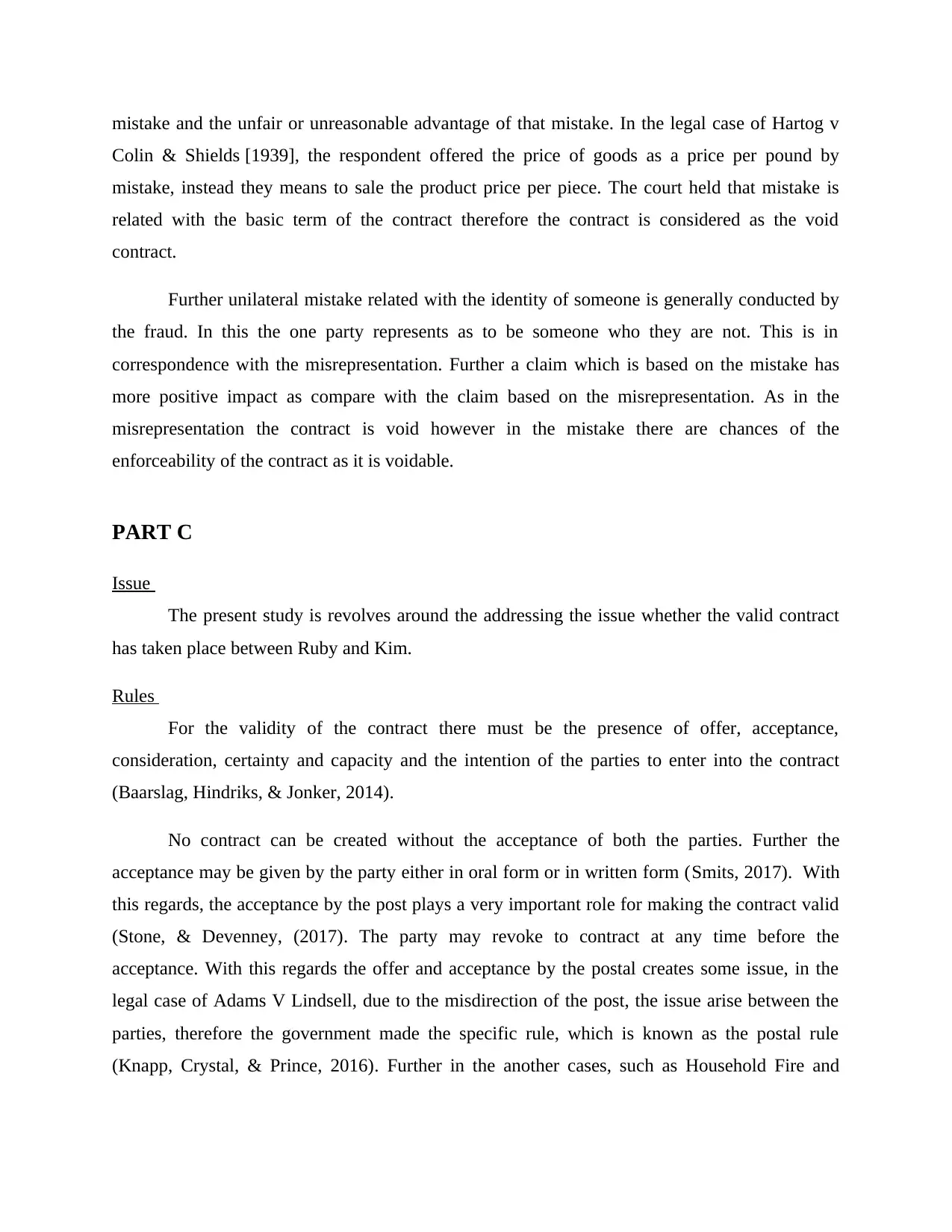
mistake and the unfair or unreasonable advantage of that mistake. In the legal case of Hartog v
Colin & Shields [1939], the respondent offered the price of goods as a price per pound by
mistake, instead they means to sale the product price per piece. The court held that mistake is
related with the basic term of the contract therefore the contract is considered as the void
contract.
Further unilateral mistake related with the identity of someone is generally conducted by
the fraud. In this the one party represents as to be someone who they are not. This is in
correspondence with the misrepresentation. Further a claim which is based on the mistake has
more positive impact as compare with the claim based on the misrepresentation. As in the
misrepresentation the contract is void however in the mistake there are chances of the
enforceability of the contract as it is voidable.
PART C
Issue
The present study is revolves around the addressing the issue whether the valid contract
has taken place between Ruby and Kim.
Rules
For the validity of the contract there must be the presence of offer, acceptance,
consideration, certainty and capacity and the intention of the parties to enter into the contract
(Baarslag, Hindriks, & Jonker, 2014).
No contract can be created without the acceptance of both the parties. Further the
acceptance may be given by the party either in oral form or in written form (Smits, 2017). With
this regards, the acceptance by the post plays a very important role for making the contract valid
(Stone, & Devenney, (2017). The party may revoke to contract at any time before the
acceptance. With this regards the offer and acceptance by the postal creates some issue, in the
legal case of Adams V Lindsell, due to the misdirection of the post, the issue arise between the
parties, therefore the government made the specific rule, which is known as the postal rule
(Knapp, Crystal, & Prince, 2016). Further in the another cases, such as Household Fire and
Colin & Shields [1939], the respondent offered the price of goods as a price per pound by
mistake, instead they means to sale the product price per piece. The court held that mistake is
related with the basic term of the contract therefore the contract is considered as the void
contract.
Further unilateral mistake related with the identity of someone is generally conducted by
the fraud. In this the one party represents as to be someone who they are not. This is in
correspondence with the misrepresentation. Further a claim which is based on the mistake has
more positive impact as compare with the claim based on the misrepresentation. As in the
misrepresentation the contract is void however in the mistake there are chances of the
enforceability of the contract as it is voidable.
PART C
Issue
The present study is revolves around the addressing the issue whether the valid contract
has taken place between Ruby and Kim.
Rules
For the validity of the contract there must be the presence of offer, acceptance,
consideration, certainty and capacity and the intention of the parties to enter into the contract
(Baarslag, Hindriks, & Jonker, 2014).
No contract can be created without the acceptance of both the parties. Further the
acceptance may be given by the party either in oral form or in written form (Smits, 2017). With
this regards, the acceptance by the post plays a very important role for making the contract valid
(Stone, & Devenney, (2017). The party may revoke to contract at any time before the
acceptance. With this regards the offer and acceptance by the postal creates some issue, in the
legal case of Adams V Lindsell, due to the misdirection of the post, the issue arise between the
parties, therefore the government made the specific rule, which is known as the postal rule
(Knapp, Crystal, & Prince, 2016). Further in the another cases, such as Household Fire and
⊘ This is a preview!⊘
Do you want full access?
Subscribe today to unlock all pages.

Trusted by 1+ million students worldwide
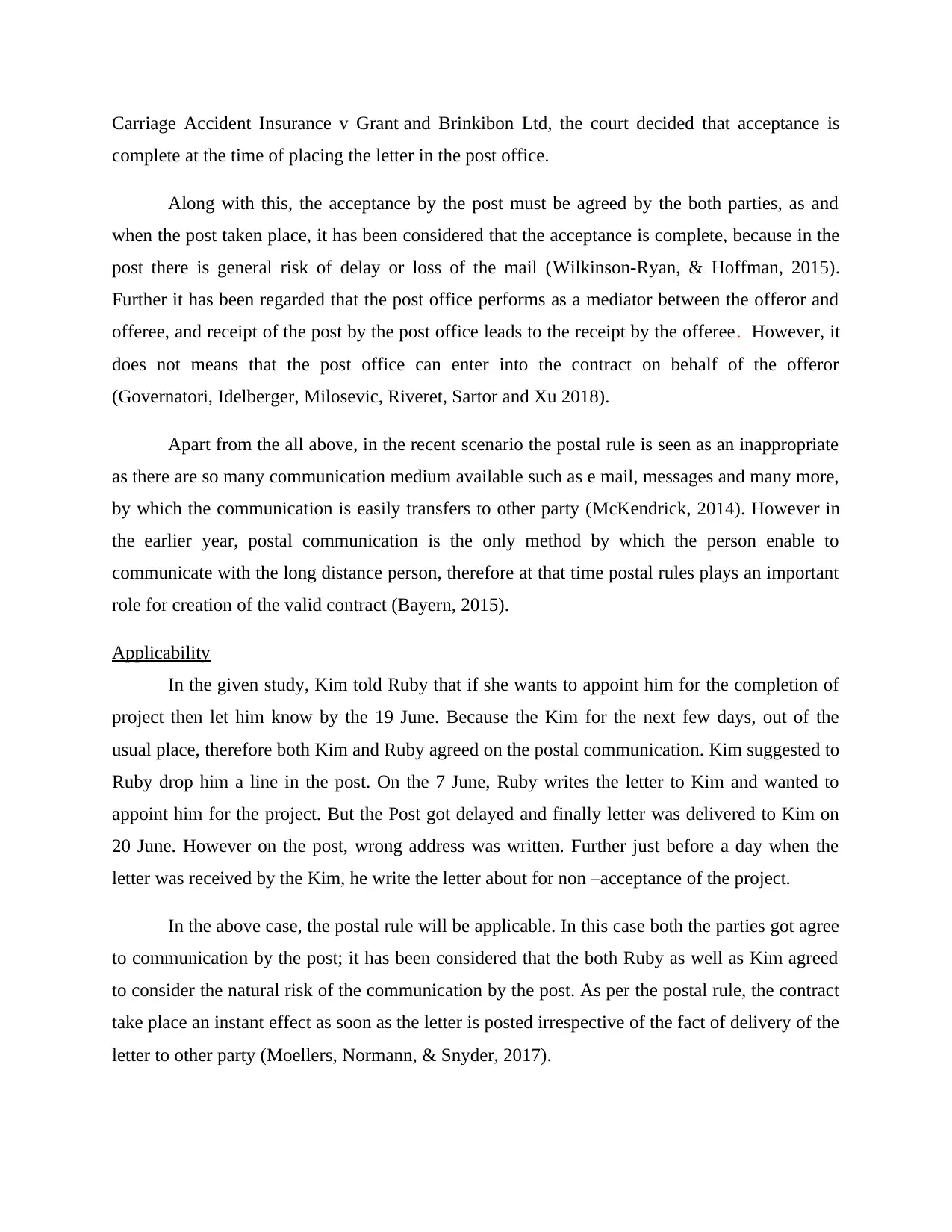
Carriage Accident Insurance v Grant and Brinkibon Ltd, the court decided that acceptance is
complete at the time of placing the letter in the post office.
Along with this, the acceptance by the post must be agreed by the both parties, as and
when the post taken place, it has been considered that the acceptance is complete, because in the
post there is general risk of delay or loss of the mail (Wilkinson-Ryan, & Hoffman, 2015).
Further it has been regarded that the post office performs as a mediator between the offeror and
offeree, and receipt of the post by the post office leads to the receipt by the offeree. However, it
does not means that the post office can enter into the contract on behalf of the offeror
(Governatori, Idelberger, Milosevic, Riveret, Sartor and Xu 2018).
Apart from the all above, in the recent scenario the postal rule is seen as an inappropriate
as there are so many communication medium available such as e mail, messages and many more,
by which the communication is easily transfers to other party (McKendrick, 2014). However in
the earlier year, postal communication is the only method by which the person enable to
communicate with the long distance person, therefore at that time postal rules plays an important
role for creation of the valid contract (Bayern, 2015).
Applicability
In the given study, Kim told Ruby that if she wants to appoint him for the completion of
project then let him know by the 19 June. Because the Kim for the next few days, out of the
usual place, therefore both Kim and Ruby agreed on the postal communication. Kim suggested to
Ruby drop him a line in the post. On the 7 June, Ruby writes the letter to Kim and wanted to
appoint him for the project. But the Post got delayed and finally letter was delivered to Kim on
20 June. However on the post, wrong address was written. Further just before a day when the
letter was received by the Kim, he write the letter about for non –acceptance of the project.
In the above case, the postal rule will be applicable. In this case both the parties got agree
to communication by the post; it has been considered that the both Ruby as well as Kim agreed
to consider the natural risk of the communication by the post. As per the postal rule, the contract
take place an instant effect as soon as the letter is posted irrespective of the fact of delivery of the
letter to other party (Moellers, Normann, & Snyder, 2017).
complete at the time of placing the letter in the post office.
Along with this, the acceptance by the post must be agreed by the both parties, as and
when the post taken place, it has been considered that the acceptance is complete, because in the
post there is general risk of delay or loss of the mail (Wilkinson-Ryan, & Hoffman, 2015).
Further it has been regarded that the post office performs as a mediator between the offeror and
offeree, and receipt of the post by the post office leads to the receipt by the offeree. However, it
does not means that the post office can enter into the contract on behalf of the offeror
(Governatori, Idelberger, Milosevic, Riveret, Sartor and Xu 2018).
Apart from the all above, in the recent scenario the postal rule is seen as an inappropriate
as there are so many communication medium available such as e mail, messages and many more,
by which the communication is easily transfers to other party (McKendrick, 2014). However in
the earlier year, postal communication is the only method by which the person enable to
communicate with the long distance person, therefore at that time postal rules plays an important
role for creation of the valid contract (Bayern, 2015).
Applicability
In the given study, Kim told Ruby that if she wants to appoint him for the completion of
project then let him know by the 19 June. Because the Kim for the next few days, out of the
usual place, therefore both Kim and Ruby agreed on the postal communication. Kim suggested to
Ruby drop him a line in the post. On the 7 June, Ruby writes the letter to Kim and wanted to
appoint him for the project. But the Post got delayed and finally letter was delivered to Kim on
20 June. However on the post, wrong address was written. Further just before a day when the
letter was received by the Kim, he write the letter about for non –acceptance of the project.
In the above case, the postal rule will be applicable. In this case both the parties got agree
to communication by the post; it has been considered that the both Ruby as well as Kim agreed
to consider the natural risk of the communication by the post. As per the postal rule, the contract
take place an instant effect as soon as the letter is posted irrespective of the fact of delivery of the
letter to other party (Moellers, Normann, & Snyder, 2017).
Paraphrase This Document
Need a fresh take? Get an instant paraphrase of this document with our AI Paraphraser
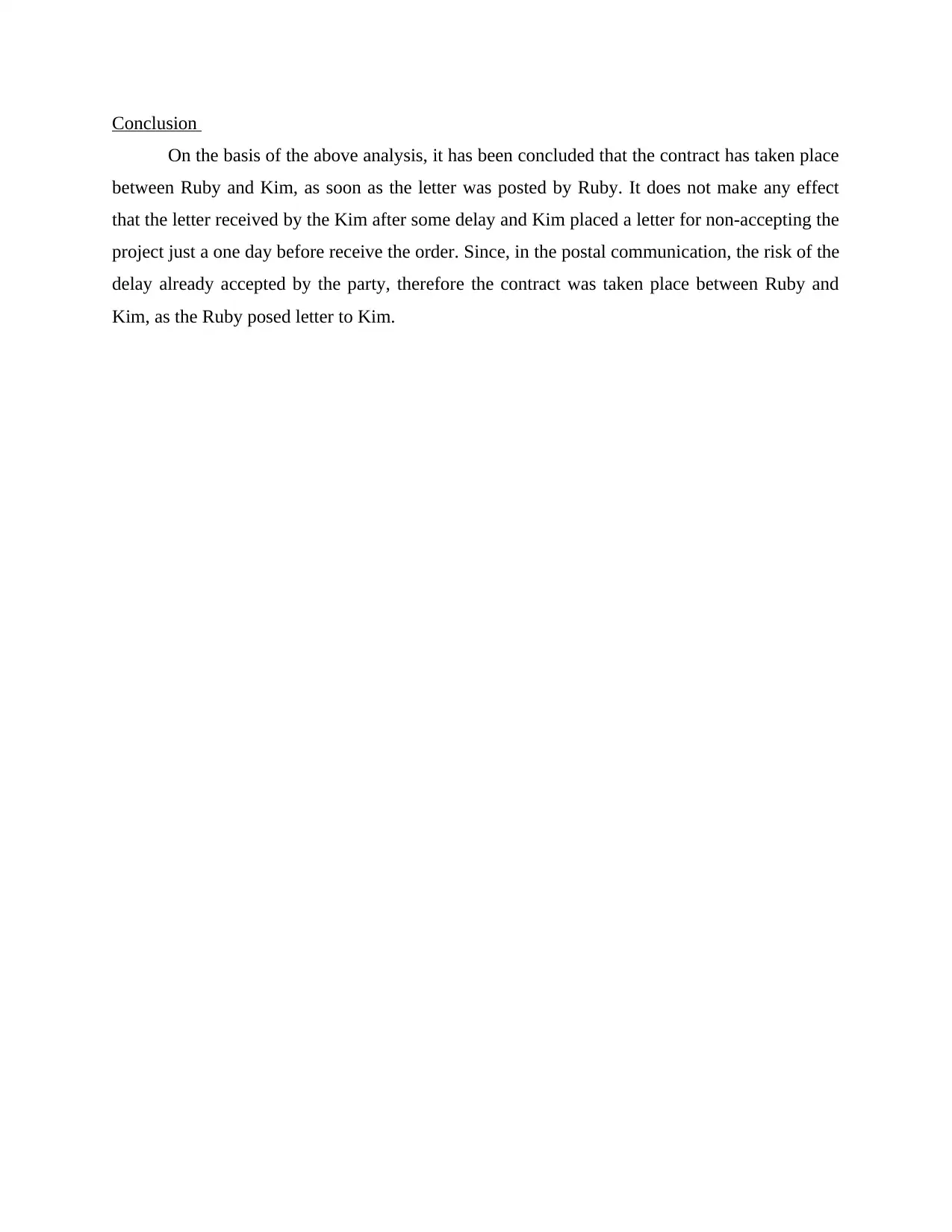
Conclusion
On the basis of the above analysis, it has been concluded that the contract has taken place
between Ruby and Kim, as soon as the letter was posted by Ruby. It does not make any effect
that the letter received by the Kim after some delay and Kim placed a letter for non-accepting the
project just a one day before receive the order. Since, in the postal communication, the risk of the
delay already accepted by the party, therefore the contract was taken place between Ruby and
Kim, as the Ruby posed letter to Kim.
On the basis of the above analysis, it has been concluded that the contract has taken place
between Ruby and Kim, as soon as the letter was posted by Ruby. It does not make any effect
that the letter received by the Kim after some delay and Kim placed a letter for non-accepting the
project just a one day before receive the order. Since, in the postal communication, the risk of the
delay already accepted by the party, therefore the contract was taken place between Ruby and
Kim, as the Ruby posed letter to Kim.
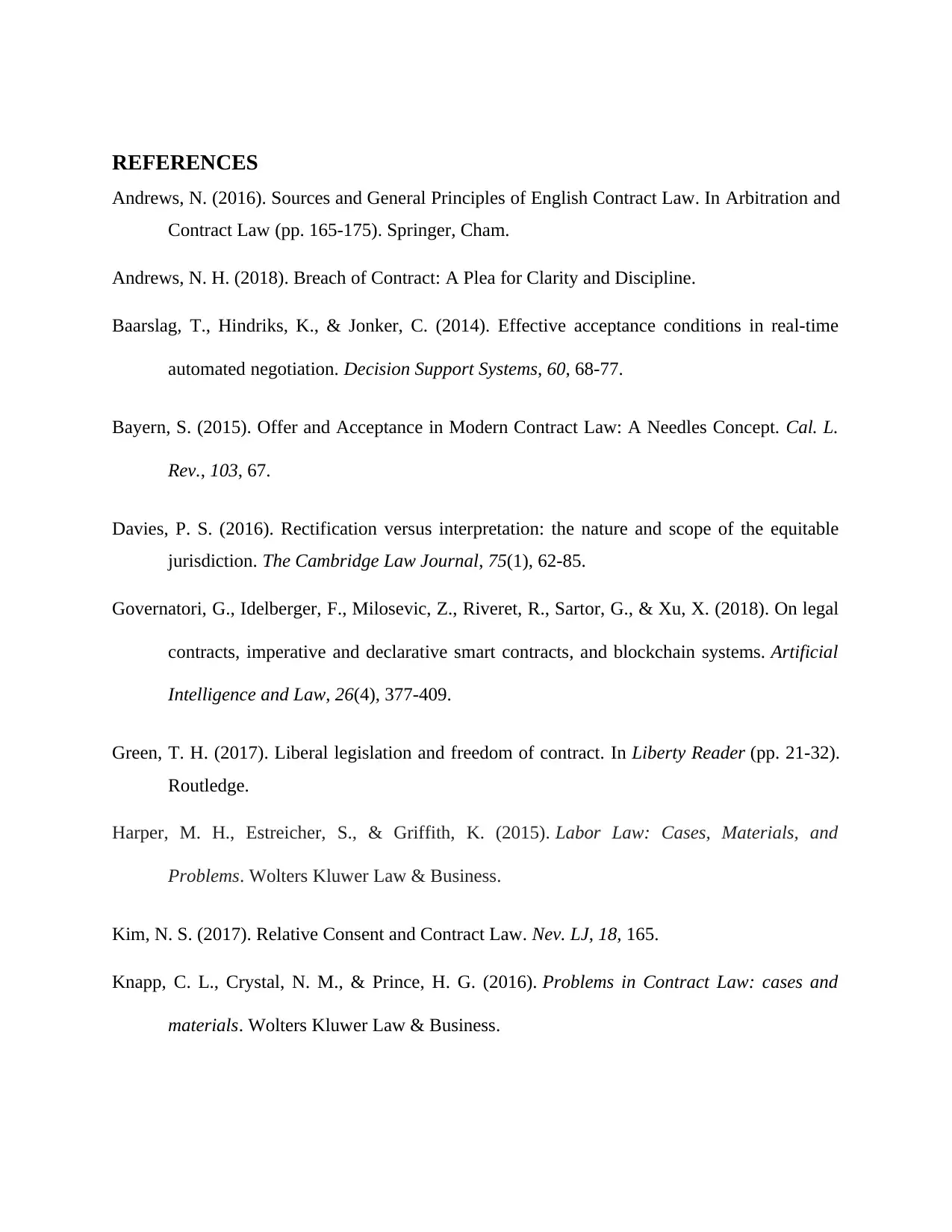
REFERENCES
Andrews, N. (2016). Sources and General Principles of English Contract Law. In Arbitration and
Contract Law (pp. 165-175). Springer, Cham.
Andrews, N. H. (2018). Breach of Contract: A Plea for Clarity and Discipline.
Baarslag, T., Hindriks, K., & Jonker, C. (2014). Effective acceptance conditions in real-time
automated negotiation. Decision Support Systems, 60, 68-77.
Bayern, S. (2015). Offer and Acceptance in Modern Contract Law: A Needles Concept. Cal. L.
Rev., 103, 67.
Davies, P. S. (2016). Rectification versus interpretation: the nature and scope of the equitable
jurisdiction. The Cambridge Law Journal, 75(1), 62-85.
Governatori, G., Idelberger, F., Milosevic, Z., Riveret, R., Sartor, G., & Xu, X. (2018). On legal
contracts, imperative and declarative smart contracts, and blockchain systems. Artificial
Intelligence and Law, 26(4), 377-409.
Green, T. H. (2017). Liberal legislation and freedom of contract. In Liberty Reader (pp. 21-32).
Routledge.
Harper, M. H., Estreicher, S., & Griffith, K. (2015). Labor Law: Cases, Materials, and
Problems. Wolters Kluwer Law & Business.
Kim, N. S. (2017). Relative Consent and Contract Law. Nev. LJ, 18, 165.
Knapp, C. L., Crystal, N. M., & Prince, H. G. (2016). Problems in Contract Law: cases and
materials. Wolters Kluwer Law & Business.
Andrews, N. (2016). Sources and General Principles of English Contract Law. In Arbitration and
Contract Law (pp. 165-175). Springer, Cham.
Andrews, N. H. (2018). Breach of Contract: A Plea for Clarity and Discipline.
Baarslag, T., Hindriks, K., & Jonker, C. (2014). Effective acceptance conditions in real-time
automated negotiation. Decision Support Systems, 60, 68-77.
Bayern, S. (2015). Offer and Acceptance in Modern Contract Law: A Needles Concept. Cal. L.
Rev., 103, 67.
Davies, P. S. (2016). Rectification versus interpretation: the nature and scope of the equitable
jurisdiction. The Cambridge Law Journal, 75(1), 62-85.
Governatori, G., Idelberger, F., Milosevic, Z., Riveret, R., Sartor, G., & Xu, X. (2018). On legal
contracts, imperative and declarative smart contracts, and blockchain systems. Artificial
Intelligence and Law, 26(4), 377-409.
Green, T. H. (2017). Liberal legislation and freedom of contract. In Liberty Reader (pp. 21-32).
Routledge.
Harper, M. H., Estreicher, S., & Griffith, K. (2015). Labor Law: Cases, Materials, and
Problems. Wolters Kluwer Law & Business.
Kim, N. S. (2017). Relative Consent and Contract Law. Nev. LJ, 18, 165.
Knapp, C. L., Crystal, N. M., & Prince, H. G. (2016). Problems in Contract Law: cases and
materials. Wolters Kluwer Law & Business.
⊘ This is a preview!⊘
Do you want full access?
Subscribe today to unlock all pages.

Trusted by 1+ million students worldwide
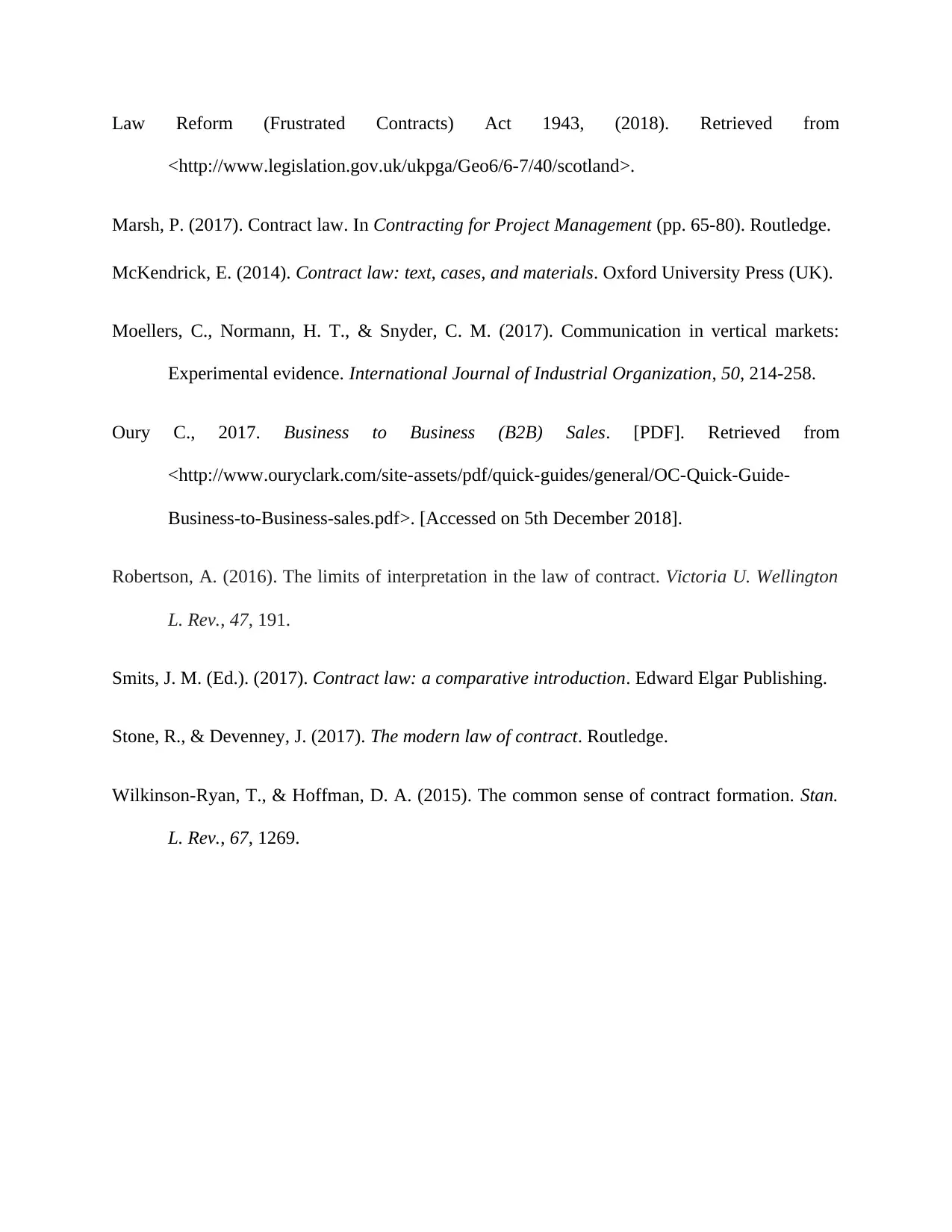
Law Reform (Frustrated Contracts) Act 1943, (2018). Retrieved from
<http://www.legislation.gov.uk/ukpga/Geo6/6-7/40/scotland>.
Marsh, P. (2017). Contract law. In Contracting for Project Management (pp. 65-80). Routledge.
McKendrick, E. (2014). Contract law: text, cases, and materials. Oxford University Press (UK).
Moellers, C., Normann, H. T., & Snyder, C. M. (2017). Communication in vertical markets:
Experimental evidence. International Journal of Industrial Organization, 50, 214-258.
Oury C., 2017. Business to Business (B2B) Sales. [PDF]. Retrieved from
<http://www.ouryclark.com/site-assets/pdf/quick-guides/general/OC-Quick-Guide-
Business-to-Business-sales.pdf>. [Accessed on 5th December 2018].
Robertson, A. (2016). The limits of interpretation in the law of contract. Victoria U. Wellington
L. Rev., 47, 191.
Smits, J. M. (Ed.). (2017). Contract law: a comparative introduction. Edward Elgar Publishing.
Stone, R., & Devenney, J. (2017). The modern law of contract. Routledge.
Wilkinson-Ryan, T., & Hoffman, D. A. (2015). The common sense of contract formation. Stan.
L. Rev., 67, 1269.
<http://www.legislation.gov.uk/ukpga/Geo6/6-7/40/scotland>.
Marsh, P. (2017). Contract law. In Contracting for Project Management (pp. 65-80). Routledge.
McKendrick, E. (2014). Contract law: text, cases, and materials. Oxford University Press (UK).
Moellers, C., Normann, H. T., & Snyder, C. M. (2017). Communication in vertical markets:
Experimental evidence. International Journal of Industrial Organization, 50, 214-258.
Oury C., 2017. Business to Business (B2B) Sales. [PDF]. Retrieved from
<http://www.ouryclark.com/site-assets/pdf/quick-guides/general/OC-Quick-Guide-
Business-to-Business-sales.pdf>. [Accessed on 5th December 2018].
Robertson, A. (2016). The limits of interpretation in the law of contract. Victoria U. Wellington
L. Rev., 47, 191.
Smits, J. M. (Ed.). (2017). Contract law: a comparative introduction. Edward Elgar Publishing.
Stone, R., & Devenney, J. (2017). The modern law of contract. Routledge.
Wilkinson-Ryan, T., & Hoffman, D. A. (2015). The common sense of contract formation. Stan.
L. Rev., 67, 1269.
1 out of 10
Related Documents
Your All-in-One AI-Powered Toolkit for Academic Success.
+13062052269
info@desklib.com
Available 24*7 on WhatsApp / Email
![[object Object]](/_next/static/media/star-bottom.7253800d.svg)
Unlock your academic potential
Copyright © 2020–2025 A2Z Services. All Rights Reserved. Developed and managed by ZUCOL.




